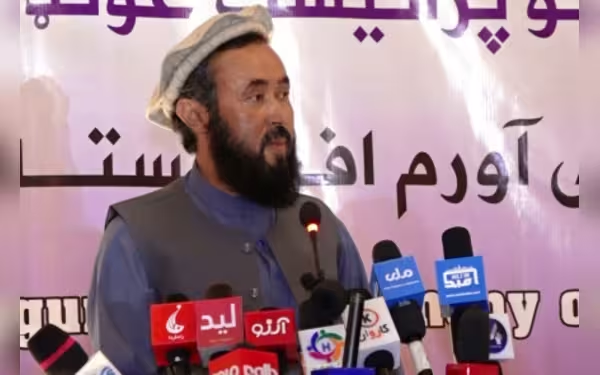Saturday, November 16, 2024 07:34 PM
Nazari Warns of Economic Warfare Against Afghanistan
- Nazari highlights economic warfare targeting Afghan citizens.
- Government urged to enhance investment and job creation.
- Modern financial systems essential for economic stability.
 Image Credits: thefrontierpost
Image Credits: thefrontierpostAbdul Latif Nazari warns of economic warfare against Afghanistan, urging government action for investment and job creation.
In recent discussions in Kabul, Abdul Latif Nazari, the technical deputy of the Ministry of Economy, expressed serious concerns regarding the economic challenges facing Afghanistan. He stated that the enemies of Afghanistan are employing economic warfare to undermine the Afghan people. This tactic comes after failed attempts to achieve their goals through political and military means. Nazari emphasized, “When the enemies of the Afghan people could not achieve their goals politically, and when they could not pursue their objectives militarily, they now want to bring our people to their knees through economic warfare.”
In a related statement, Zar Mohammad Haqqani, the Deputy Minister of Hajj and Religious Affairs, highlighted the government's responsibility to foster trade, industry, and job creation, aiming to improve the living conditions for the citizens. The Chamber of Commerce and Investment echoed these sentiments, asserting that for Afghanistan to attain self-sufficiency across various sectors, the Islamic Emirate must enhance investment opportunities and promote economic growth.
Khanjan Alokozay, a board member of the Chamber of Commerce and Investment, urged the government to implement necessary facilities, establish clear laws, create job opportunities, ensure reliable electricity supply, and combat corruption. These steps are crucial for revitalizing the economy and providing a stable environment for businesses to thrive.
Abdul Rahman Rahmani, the chief of Da Afghanistan Breshna Sherkat, pointed out the advantages of modern financial systems. He noted, “For this, we have many benefits in our country. First, less time and energy are used because each person can transfer money from any location without standing in bank queues.” This highlights the need for efficient financial services that can ease the burden on the Afghan populace.
During a recent program aimed at launching a new product, “Mobile Electronic Money Services,” officials from a private company stressed the importance of adopting modern technology for money transfers. Ajmal Khan Momand, the CEO of the private company, stated, “Your individual and commercial transactions will be conducted with transparency, speed, and accuracy. We manage the salaries of government and non-governmental agencies and their other payments via mobile.” This innovation is seen as a vital step in preventing the deterioration of the Afghan currency, which has been a growing concern.
The physical use of cash has contributed to its decline, prompting the Central Bank and various companies in Afghanistan to explore electronic money services as a solution. As Afghanistan navigates these economic challenges, the emphasis on modern financial solutions and government accountability will be crucial in ensuring a stable and prosperous future for its citizens.
The ongoing economic warfare against Afghanistan poses significant challenges, but with the right strategies and innovations, there is hope for recovery and growth. The commitment from government officials and the private sector to improve economic conditions is a positive sign. By embracing modern technology and fostering a supportive environment for investment, Afghanistan can work towards a more resilient economy that benefits all its people.













